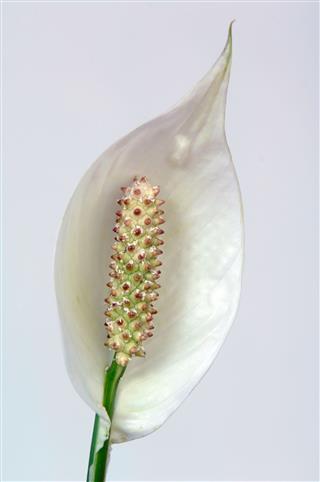
Peace lilies are poisonous to both humans and pets. When consumed by chance, the sap and juice of the plant may interfere with blood calcium level, thereby making the blood toxic.
Peace lily is the common name for the species Spathiphyllum cochlearispathum. The plant is characterized by long broad leaves and beautiful white flowers. Despite all that beauty, peace lily is poisonous. Though, its effect on humans are mild, pets and small kids may develop health problems, if they ingest parts of this plant.
Peace Lily Poisoning: An Overview
Mode of Poisoning
Peace lily is not only poisonous to human beings but also to dogs and cats. Its juice and sap has high concentration of oxalates. If the plant is chewed by chance, then these oxalate crystals, having high affinity for calcium, absorbs it rapidly from the bloodstream. As a result calcium depletes from blood and calcium oxalate crystals are formed. Toxic reactions take place inside the body, disruption is caused to cell membrane functions and the calcium oxalate crystals can also accumulate in the kidneys.
Symptoms in Humans
As mentioned above, adult humans may not experience any severe effects, if parts of peace lily are ingested in very small amounts. Some may develop itching and burning sensation, after handling the plant. If ingested in large amounts, the plant may cause tremendous discomfort in adults. According to reports of the American Association of Poison Control Center, peace lily is one of those plants that are behind the has shown that more than 700 children under the age of six and below nineteen years were poisoned with peace lily. They were hospitalized and were under medication for several days.
Usually children suffer from diarrhea and vomiting after chewing the leaves. The sap when mixes with blood leads to puffy mouth, irritation and burning sensation in the throat, mouth and lips. Nausea, headache, lethargy, constant salivation, and loss of appetite are also associated with peace lily poisoning in adults as well as children. When consumed in excess, large amounts of calcium is removed from the blood, causing hypocalcaemia. Respiration problems, choking and kidney failure could also be some other serious consequences of peace lily poisoning.
Symptoms in Pets
Dogs and cats are the most vulnerable to peace lily poisoning. What pets do is, they sniff the plants, mess with the pots and in the process of doing so they swallow the leaves, flowers, etc. They start sneezing and coughing immediately after chewing the plant. You should make them vomit deliberately to avoid poisoning. When left unattended, they experience severe irritation and burning in their mouth, tongue and stomach. They drool excessively, face difficulty in swallowing and breathing, become sluggish and vomit repeatedly. Same symptoms are observed in cats. Their behavior changes drastically; it affects their mood (become lethargic and depressed) as well as physical health. Their frequency of urination reduces after being poisoned heavily by peace lily. Cats are highly sensitive to peace lilies because if left untreated for more than 72 hours, they can die of renal failure.
Necessary Precautions
Keep the plant pots away from the reach of children and pets. You can hang them from a height where they cannot reach. The other option is to place the plant inside a protected glass cabinet when you are using it for the purpose of ornamentation. Make sure that the leaves, flowers, petals, etc are not scattered on the ground. Spray the plants with pet deterrents or black pepper so that even if they have chewed by chance, they throw up immediately.
Treatment
First make the person rinse his mouth thoroughly with water for a couple of times. You should perform this fluid detoxification process on your pet as well. Then take him to a doctor for medical diagnosis and proper treatment. Doctors suggest drinking plenty of fruit juices and consumption of calcium rich foods, like yogurt, cheese and milk. Calcium tablets also aid in nullifying the toxic effects by precipitating soluble oxalate. When calcium is supplied externally, it replenishes blood calcium and prevents further health complications. Follow the same home remedies to provide relief to your pet and make sure you take it to a vet to ensure complete recovery from peace lily poisoning.
Do not panic if your pet or any family member has been poisoned with peace lily. Provide him the first aid and then take him to a doctor practicing nearest to your residence. Never neglect the symptoms, rather be a little proactive in offering the first aid. Last but not the least, I must mention that if you have planted a peace lily at your home, you have to be a lot careful.





